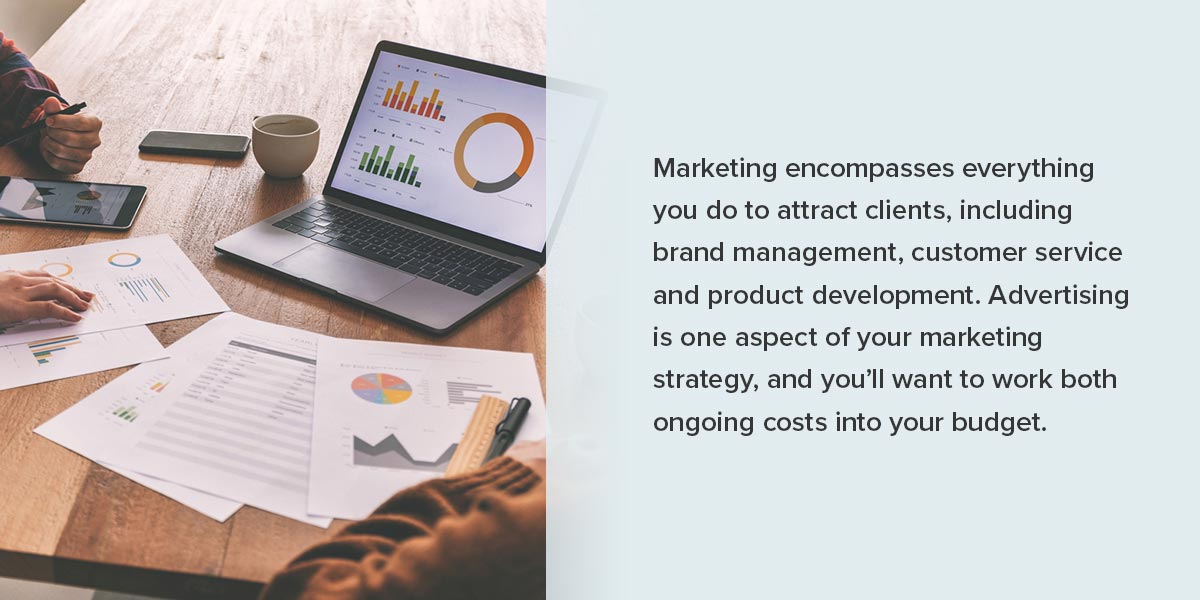Table of Contents - Quick Links
You know your industry backward and forward, and you’re finally ready to take the leap and start your own business. Now that you’ve decided to make the possibility a reality, it’s time to consider the practical parts of making it happen. You have the knowledge, but do you have the funding?
You’ll need to know your expenses to determine how much capital you’ll need to get your small business off the ground. We’ve assembled this primer to help you understand the different types of business costs and how calculating yours can help.
Ongoing vs. One-Time Business Costs
You can divide startup costs for small businesses into two main categories — one-time costs and ongoing expenses. The difference between the two is fairly simple.
As the name suggests, one-time costs are the business costs you only pay once. For example, you’ll only need to pay your incorporation fee when you incorporate. Purchasing the equipment you’ll need for your business is also a one-time cost. However, if you decide to rent instead of buy, your equipment becomes an ongoing expense.
Ongoing expenses — also called operating costs — are things you pay for on a continual basis. Software-as-a-service (SaaS) applications that operate as subscriptions are ongoing costs, as are things like insurance, payroll and marketing expenses. These expenses will factor into your ongoing budget.
7 Different Types of Small Business Startup Costs
While the total startup costs for a business vary by the company’s size, location and nature, some business costs are more common than others. Here are some of the types you’re most likely to encounter.
1. Market Research
Researching your industry and the prospective location’s consumer base should be your first expense. Understanding your market will start you out a step ahead and increase your chances of success. Whether you gather this research yourself or hire a market research firm, you’ll pay in either time or money.
If your budget is slim, you may want to invest your time and conduct your own market research. If you decide to take advantage of a market research firm’s experience and resources, your cost will depend on the level of detail and assistance you ask for.
2. Incorporation and Licensing
One of your most important startup costs — and one you’ll want to handle early — will be registering your business and securing any necessary permits or licenses. These one-time costs will vary based on:
- Whether you register your business as a partnership, sole proprietorship, limited liability company (LLC) or corporation.
- The licenses and permits your industry requires.
- Any state-specific requirements.
3. Equipment Costs
Regardless of what type of business you’re building, you’ll need equipment to get it started. Retail establishments need product displays, inventory systems and some form of payment processing, while construction companies need tools, heavy equipment and safety gear. Even a one-person online consulting business will need a computer and modem.
Consider what your budget can handle when deciding between paying more upfront for high-quality equipment versus the long-term costs of replacing it over time. As we mentioned above, whether your equipment is a one-time cost or an ongoing expense will depend on whether you decide to buy or rent.

4. Advertising and Marketing
It’s essential for businesses to get the word out about the products or services they offer, and that goes double for a new business. Before you can start making sales, people have to know who you are, making advertising a crucial startup cost. You can use anything from paid ads and business cards to branded social media accounts and a professional website to get your name in people’s heads.
Marketing encompasses everything you do to attract clients, including brand management, customer service and product development. Advertising is one aspect of your marketing strategy, and you’ll want to work both ongoing costs into your budget.
5. Payroll
If you plan to hire additional employees, payroll will be one of your most significant ongoing expenses. While it may be tempting to cut costs here — especially if your business isn’t making a profit yet — providing competitive compensation is the only way to keep quality employees who can help your company thrive. Prioritizing that compensation will help maintain morale and can even generate positive publicity.
Your payroll costs will need to account for the total cost of labor, which includes:
- Wages and salaries.
- Benefits.
- Paid time off.
- Overtime.
- Bonuses.
- Commissions.
6. Insurance
Insurance is another vital ongoing cost to work into your budget. Some of the most important insurance options for business owners include:
- Workers’ compensation.
- General liability.
- Professional liability.
- Business owners’ policy.
You may also want additional coverage depending on your industry and the details of your business. For example, you might want to consider commercial property insurance if you own the property your business occupies. While certain risk factors will increase your premium, they also make it more likely that you may need the policy.
7. Utilities and Office Supplies
Unless your business is entirely remote, building utilities and office supplies will represent a significant cost. Some — like desks and chairs — will be one-time costs, though you’ll still need to replace them periodically. Many utilities also charge one-time connection and application fees when you sign up. You’ll want to include other supplies in your budget as ongoing expenses, including:
- Paper goods like notebooks, sticky notes, file folders, printing paper and any other paper products.
- Pens, pencils, highlighters and dry-erase markers.
- Paperclips, staples and binder clips.
- Ink or toner.
- Filing cabinets.
- Monthly utility bills for electricity, gas, internet, water, trash, sewage and similar.
Why Calculate Your Small Business Startup Costs?
Developing a small business cost breakdown is crucial to understanding what you’ll need to succeed. By calculating your startup costs, you’ll be able to:
- Uncover all your business expenses: Understanding all your expenses and eliminating any hidden costs is crucial for building a solid business plan. In addition to giving you peace of mind by accounting for everything, that attention to detail can make it easier to secure a loan or other funding.
- Determine how much funding you need: Once you know how much you’ll need to spend to get your business up and running, you’ll have a better idea of the funding you’ll need to secure. Knowing your break-even point will help you also figure out how long it will take to see a return on your investment.
- Identify your break-even point: Your business’s break-even point is when your revenue equals your total expenses. Any revenue beyond that point is profit, making this essential information for potential investors.
Contact Porter Capital to Help With Funding for Your Small Business
As you prepare to launch your small business, you’ll need to be ready for an array of one-time costs and ongoing expenses. If you need funding to help cover those costs and get your business off the ground, Porter Capital can help.
As a direct lender and factoring company, we’ve supplied more than $6 billion in capital solutions for businesses of all kinds. Our working capital loans can help you cover the ongoing expenses of daily operations. We can also help speed up your cash flow with invoice factoring, letting you trade your unpaid accounts receivable for a reliable cash advance.
Contact us online or call us at 1-888-865-7678 to learn how we can help you manage your business cash flow and secure the funding you need!
Try Our Financial Calculators
At Porter Capital, we use our financial calculators to help businesses perform a data-driven analysis of their financial positioning and optimize their financial operations. Use our financial calculators to gain accurate insights into your financial situation, investments, or planning.




